|
|
|
Sort Order |
|
|
|
Items / Page
|
|
|
|
|
|
|
| Srl | Item |
| 1 |
ID:
077251
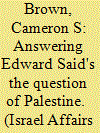

|
|
|
| 2 |
ID:
145125
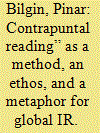

|
|
|
|
|
| Summary/Abstract |
How to approach Global International Relations (IR)? This is a question asked by students of IR who recognize the limits of our field while expressing their concern that those who strive for a Global IR have been less-than-clear about the “how to?” question. In this article, I point to Edward W. Said’s approach to “contrapuntal reading” as one way of approaching Global IR that embraces diversity and reflects multiple and overlapping experiences and perspectives of humankind. More specifically, I suggest that contrapuntal reading offers students of IR a method of studying world politics that focuses on our “intertwined and overlapping histories,” past and present; an ethos for approaching IR through raising the “contrapuntal awareness” of its students and offering an anchor for those who translate the findings of different perspectives; and a metaphor for thinking about Global IR as regional and global, one and many.
|
|
|
|
|
|
|
|
|
|
|
|
|
|
|
|
| 3 |
ID:
148286
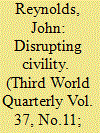

|
|
|
|
|
| Summary/Abstract |
This paper is a reflection on the role of intellectuals in engaging with Palestinian solidarity movements and liberation discourses, and on the place of international lawyers specifically within that context. The paper considers ‘the question of Palestine’ as a rigorous test for intellectuals in the Global North today, and examines particular debates over free speech, civility and balance that unfolded in the wake of Israel’s 2014 war on Gaza. It considers the interventions of international lawyers in these debates with reference to Edward Said’s ‘amateur’ and ‘professional’ intellectuals, and explores ways in which anti-colonial international lawyers (as amateur intellectuals) can transcend prevailing professional orthodoxies to deploy language, arguments or tactics that rupture liberal legal processes and narratives on Palestine.
|
|
|
|
|
|
|
|
|
|
|
|
|
|
|
|
| 4 |
ID:
123610
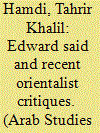

|
|
|
| 5 |
ID:
124923
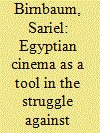

|
|
|
|
|
| Publication |
2013.
|
| Summary/Abstract |
The cinema has been used by Egyptian regimes, from the monarchy until Mubarak, to resist the political agenda of Islamic radicals and terrorists. Edward Said and others describe Islamic terrorists' images in the Western media as "Western fantasies." Nevertheless, for Egyptian intellectuals, terrorists were and remain a stark reality. In Egypt, the entire state apparatus was set in motion to fight Islamic terrorism. The state was unprepared for the massive popular uprising of 2011. While the direction that Egyptian culture will follow after Mubarak remains unclear, an important objective is to study pre-revolutionary Egyptian cinema and to understand its ideological tendencies.
|
|
|
|
|
|
|
|
|
|
|
|
|
|
|
|
| 6 |
ID:
123062
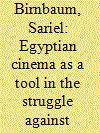

|
|
|
|
|
| Publication |
2013.
|
| Summary/Abstract |
The cinema has been used by Egyptian regimes, from the monarchy until Mubarak, to resist the political agenda of Islamic radicals and terrorists. Edward Said and others describe Islamic terrorists' images in the Western media as "Western fantasies." Nevertheless, for Egyptian intellectuals, terrorists were and remain a stark reality. In Egypt, the entire state apparatus was set in motion to fight Islamic terrorism. The state was unprepared for the massive popular uprising of 2011. While the direction that Egyptian culture will follow after Mubarak remains unclear, an important objective is to study pre-revolutionary Egyptian cinema and to understand its ideological tendencies.
|
|
|
|
|
|
|
|
|
|
|
|
|
|
|
|
| 7 |
ID:
125197
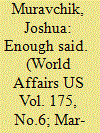

|
|
|
|
|
| Publication |
2013.
|
| Summary/Abstract |
Columbia University's English Department may seem a surprising place from which to move the world, but this is what Professor Edward Said accomplished. He not only transformed the West's perception of the Israel-Arab conflict, he also led the way toward a new, post-socialist life for leftism in which the proletariat was replaced by "people of color" as the redeemers of humankind. During the ten years that have passed since his death there have been no signs that his extraordinary influence is diminishing.
|
|
|
|
|
|
|
|
|
|
|
|
|
|
|
|
| 8 |
ID:
163256
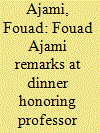

|
|
|
|
|
| Summary/Abstract |
The following is an edited transcript of remarks made by the late Fouad Ajami honoring Professor Bernard Lewis at a dinner in the latter’s honor. Ajami gives personal remembrances of Lewis and underscores Lewis’s enormous influence on Middle East Studies.
|
|
|
|
|
|
|
|
|
|
|
|
|
|
|
|
| 9 |
ID:
105933


|
|
|
|
|
| Publication |
2011.
|
| Summary/Abstract |
In this article I want to put forward an intellectual defence of the political discourse of dialogue of civilisations by challenging the idea that 'civilisation-based thinking' is necessarily a conflict-generating factor and arguing that, contrary to fashionable assumptions, a civilisational dialogue that wants to contribute to a more peaceful world order requires, in a qualified way, 'stronger' civilisational identities. In particular, I take issue with the academic criticisms to dialogue of civilisations coming from the camp of the critique of the clash of civilisations and well represented by Amartya Sen's explicit and Edward Said's more indirect critiques to 'civilisation-based thinking': by unveiling their implicit endorsement of the Westphalian/secularist presumption, I will show the counter-intuitive political implications of a dialogue among 'strong' civilisational identities and traditions when framed hermeneutically as 'fusion of horizons'. Finally I provide a supplementary brief illustration to my defence of dialogue of civilisations by criticising Said's reading of Louis Massignon - the great 20th century French scholar of Islam - as part of Orientalism and suggesting that 'in diverging agreement' with Said, Massignon's work and life stand as a very concrete proof of the possibility of a 'dialogue of civilisations' that escapes the yoke of the Orientalist accusations.
|
|
|
|
|
|
|
|
|
|
|
|
|
|
|
|
| 10 |
ID:
161162
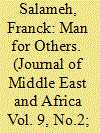

|
|
|
|
|
| Summary/Abstract |
The mere mention of Henri Lammens, Society of Jesus (SJ), provokes unease, notorious as this militant “priest-scholar” has become in postcolonial circles. Yet his failings notwithstanding, Lammens has been a victim of the academic conceits and biases of postmodernist postcolonialists through whose prisms he often emerges as a cantankerous, inflammatory, Christian polemicist, hell-bent on defaming an otherwise blameless, innocent, beatific Islam. This article suggests that a more nuanced gaze be cast at Henri Lammens, the man and missionary, before judging his scholarship; a corrective of sorts, shedding light on the life and times of a Belgian boy, who traveled East at the tender age of fifteen, who fell into the snare of Near Eastern Christians, and who set out to write their history and restore their suppressed memories—doing so not without the passion and affection of the neophyte.
|
|
|
|
|
|
|
|
|
|
|
|
|
|
|
|
| 11 |
ID:
170483


|
|
|
|
|
| Summary/Abstract |
The Reluctant Fundamentalist proves vitally engaged in the concerns of the mind and its passages reveal a struggle with difficulties of a sort that make anxiety seem an innocuous euphemism or outdated scholarly endeavor, which inevitably veers the reader's attention away from their importance in understanding the text and its world. This essay is concerned with the psychological, artistic, historical and geographical contingencies Mohsin Hamid faces in putting together his novel/la1 through the travail of production and publication. The Reluctant Fundamentalist has cemented Hamid's reputation and taken on the guise of a relatively autonomous sphere in its own fashion. Hamid resorts to powerful actions of a “begetting” kind, and specifying points of departure for his novel/la grows increasingly problematic. The novel/la is in fact intricate, and its resemblance with many productions is striking nevertheless. Going against the grain of fundamental and dominant traditions through a reluctant ethos, Hamid engages in beginnings and beginnings again to find alternatives, a Saidian reasoning read in The Reluctant Fundamentalist. Taking its cue from Hamid's reflection on the manufacturing of his own “fiction” and Said's Beginnings, this essay examines how Hamid builds on Albert Camus's La chute as a point of reference to inaugurate The Reluctant Fundamentalist which owes its genesis to miscellaneous acts of beginning based, among many others, on McEwan's Atonement and Ali's Brick Lane. Hamid also engages world events such as America's beginning as a nation and 9/11, which both have inspired the novel/la's impulse to begin and begin again in the process of production. These influences with the alternatives given make up the texture of his novel/la, which is not only creative in nature, but also theoretical and philosophical in trajectories.
|
|
|
|
|
|
|
|
|
|
|
|
|
|
|
|
| 12 |
ID:
141510


|
|
|
|
|
| Summary/Abstract |
Edward Said's Orientalism through deconstructing colonial discourses of power-knowledge postulates that colonization for the colonized has a particular ontological finality, reification. I contend here that the process of subjection has a far more profound effect than merely reifying the colonized, to borrow from Anouar Abdel-Malek, as customary, passive, non-participating, and non-autonomous. Rather, Western imperial narratives and what Said calls its “evaluative judgments” and “program of actions” also come to interpellate the reified subject's cosmovision, agency, and its forms of resistance. Focusing on the Middle East, this study is a genealogy that exposes how techniques and technologies of imperial power have symbolically and materially produced the Oriental rebel in Western history. Through re-reading institutionalized knowledges and resurrecting a counter-history, this article reveals a hidden and buried discursive formation, one which I call counter-revolutionary discourse. I argue that this system of thought is built through dispersed and heterogeneous but power-laden statements from Aymeric and Comte de Volney to Napoleon Bonaparte, Ernest Renan, Gustave Le Bon, and Thomas Friedman.
|
|
|
|
|
|
|
|
|
|
|
|
|
|
|
|
| 13 |
ID:
193011


|
|
|
|
|
| Summary/Abstract |
In Fi al-adab al-sahyuni (On Zionist Literature, 1967)Footnote1, the Palestinian writer and Popular Front for the Liberation of Palestine (PFLP) spokesperson Ghassan Kanafani provides an analysis of Zionist literary production from the early nineteenth century through the mid-twentieth century, situating it in a broader schema of Western imperialism, settler colonialism, and dispossession in Palestine. Through a treatment of the early Zionist texts, Kanafani’s study traces the evolution of literary representations of the Jewish subject and explores their utility in repudiating integration and advancing racial supremacist logics. The Zionist works in question venerate different relationships to land—extractive, romantic, fraudulent—in contrast to those of Palestinian literary and oral traditions; the former are connected to the ongoing, material efforts of colonizing Palestine. Kanafani’s study was drafted in Beirut and is a reflection of the broader sweep of Arab nationalist and anti-colonial cultural production during the 1960s and 1970s, which was targeted by an anti-communist West. These experiences were formative for Kanafani’s intellectual project, which sees literary criticism as a revolutionary tool and a direct extension of armed resistance, whereby a cultural reconstitution can be used in service of liberating both Palestinian land and people. Kanafani’s study suggests that the “weapons” of literary production will be most effectively brandished by the Arab youth who lead the struggle against Zionism.
|
|
|
|
|
|
|
|
|
|
|
|
|
|
|
|
|
|
|
|
|